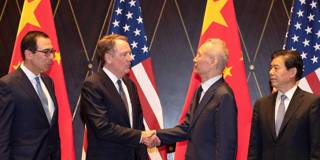Like the twentieth-century Cold War between the United States and the Soviet Union, the new rivalry between China and the West is a contest between fundamentally incompatible political systems. And the idea that freedom and democracy will prevail can no longer be taken for granted.
BERLIN – With the 30th anniversary of the fall of the Berlin Wall approaching, the issue of freedom has returned to the fore in Moscow and Hong Kong, albeit under very different historical and political circumstances. We are reminded that the modern era was built on freedom, and on the recognition that all people are born equal. This radical Enlightenment idea, when it took hold, constituted a break from all previous history. But times have changed. In the twenty-first century, we are confronted with a fundamental question: Could a modernized form of authoritarianism represent an alternative to liberal democracy and the rule of law?
In 1989, the obvious answer to that question would have been no, not just in the West but around the world. Since then, however, we have witnessed the revival of nationalism in Europe, the failure of the Arab Spring, the election of US President Donald Trump, Russia’s relapse into revanchism, and the emergence of a global China. Now, all bets on liberal democracy are off.
China’s emergence as a second military, economic, and technological superpower suggests that there is now an alternative development model. In modern China, the rule of law and democracy are regarded as a threat to one-party rule. Hence, the ongoing protests for freedom and democratic accountability in Hong Kong expose a division not just between two normative frameworks, but between two systems of political power.

BERLIN – With the 30th anniversary of the fall of the Berlin Wall approaching, the issue of freedom has returned to the fore in Moscow and Hong Kong, albeit under very different historical and political circumstances. We are reminded that the modern era was built on freedom, and on the recognition that all people are born equal. This radical Enlightenment idea, when it took hold, constituted a break from all previous history. But times have changed. In the twenty-first century, we are confronted with a fundamental question: Could a modernized form of authoritarianism represent an alternative to liberal democracy and the rule of law?
In 1989, the obvious answer to that question would have been no, not just in the West but around the world. Since then, however, we have witnessed the revival of nationalism in Europe, the failure of the Arab Spring, the election of US President Donald Trump, Russia’s relapse into revanchism, and the emergence of a global China. Now, all bets on liberal democracy are off.
China’s emergence as a second military, economic, and technological superpower suggests that there is now an alternative development model. In modern China, the rule of law and democracy are regarded as a threat to one-party rule. Hence, the ongoing protests for freedom and democratic accountability in Hong Kong expose a division not just between two normative frameworks, but between two systems of political power.